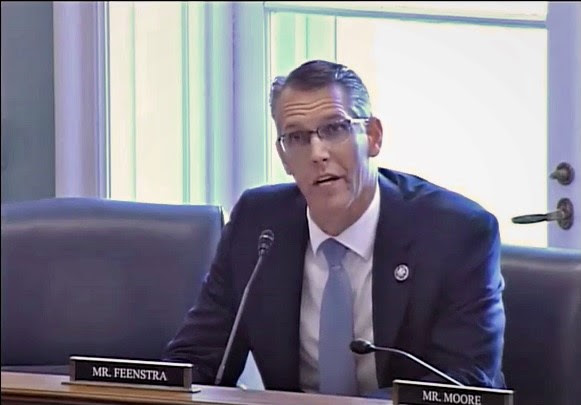Feenstra Leads Letter Highlighting Harmful Economic Impacts of Biden Administration’s Reversal on Digital Trade Policy

Last Friday, U.S. Rep. Randy Feenstra (R-Hull) led a letter with 9 of his colleagues on the House Ways and Means Committee to Secretary of the Treasury Janet Yellen outlining the harmful economic and deficit impacts of the Biden administration’s digital trade policy decisions.
“We’ve seen how foreign countries have targeted the American economy to collect additional tax revenue. The next iteration of this trend could occur following USTR’s reversal on digital trade policies that would allow foreign countries to require American businesses to either invest in those countries or lose access to those markets. Not only is this bad for jobs and investment at home, but it also increases the deficit and creates an unnecessary drag on the growth of the digital economy,” said Rep. Feenstra. “The tax implications of this decision should have been thoroughly analyzed before the Biden administration unilaterally reversed a longstanding, bipartisan position on digital trade policy. This letter seeks to identify to what extent the Treasury Department consulted with USTR about these potential tax ramifications, and I look forward to speaking with Secretary Yellen about this issue.”
In part, the lawmakers wrote that “In addition to the harmful impacts on the U.S. economy and the concession of leadership on global digital trade rules, we are concerned about the implications of USTR’s digital trade decision for U.S. tax policy. First, the data-localization requirements that would be allowed to proliferate in the absence of U.S. leadership could, in practice, require some U.S. based companies to have a taxable presence (and, in some cases, a ‘permanent establishment’ pursuant to a bilateral tax treaty) in foreign jurisdictions where common business practice otherwise would not require such presence. This could have the effect of diverting investment from the United States.”
“Second, this new requirement has significant international tax implications allowing foreign governments to claim a right to tax business revenue that would be taxed in the United States under existing law and treaties. Finally, the policy appears to be at odds with many of the objectives outlined by the Department of the Treasury, both in negotiations over Pillar One of the Organization for Economic Co-operation and Development’s (OECD) Inclusive Framework on Base Erosion and Profit Shifting, and positions described in the General Explanations of the Administration’s Fiscal Year 2025 Revenue Proposals (FY25 Greenbook),” the lawmakers continued.
The full letter can be found HERE.




